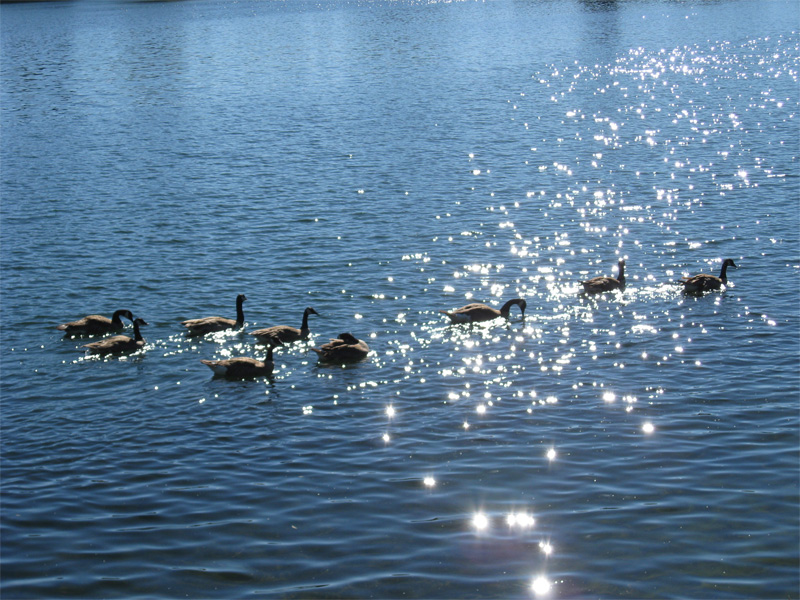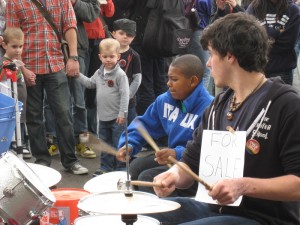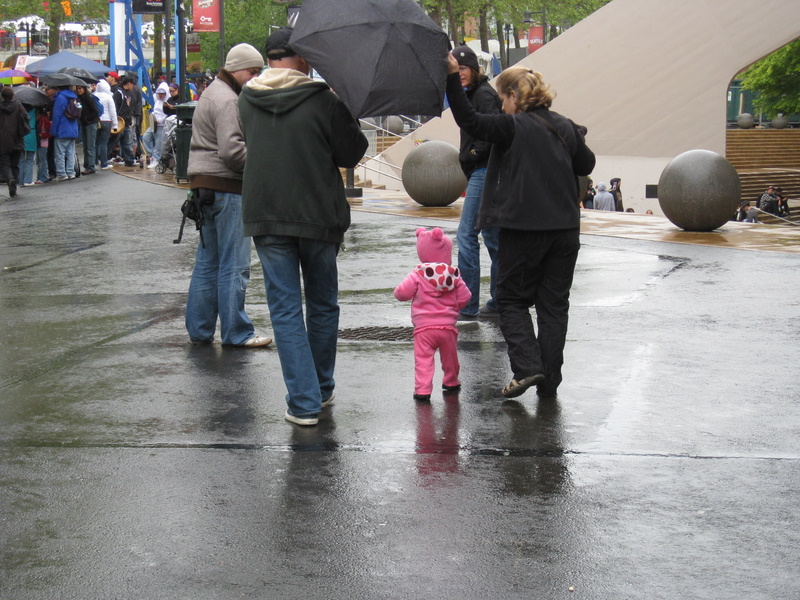
This is it. The sun is out, the days are long. God, presumably, is in his heaven, and we get a taste of it here on Earth.
It can’t last. Enjoy the ride.


This is it. The sun is out, the days are long. God, presumably, is in his heaven, and we get a taste of it here on Earth.
It can’t last. Enjoy the ride.

Summer’s almost here. The ice cream truck has already made a few tentative sweeps of the neighborhood, tootling its signature “Bicycle Built For Two” theme song. Lawn chairs have been wiped free of spiders, and umbrellas lowered to half mast. Any day now the rains will taper off and the glorious Seattle sunshine will triumph over the gray sky for a few blissful months.
Many people choose summer as a time to travel, to leave home and see exotic new lands. But it’s hard to leave Seattle in the summer, when for two straight months it’s a non-stop hiking, biking, sailing, gardening, ball playing, fireworks dazzling, festival dancing in the street kind of place. The sun comes up around four a.m. and the sky stays light until ten. You have to pace yourself so that you don’t burn out by two in the afternoon. Coffee helps. But for me the best strategy to get the most out of the summer marathon is to partake of a shady spot and a good book midway through the long afternoons.
Currently I’m savoring His Majesty’s Dragon, an exceptional fantasy by Naomi Novik, whose interest in Napoleonic history and experience as a computer programmer working on game design is reflected in the smart plotting and clear vision of her writing. The dragon at the heart of her novel is a fully realized character, and the alternate history in which dragons form an integral part of the military force is brilliantly evoked. I’m so in.
It helps, of course, that the day before I started reading the book I went to see How To Train Your Dragon. The bulk of the matinee audience was made up of fidgeting four-year-olds, a few parents, and a handful of college-age dragon enthusiasts. And then there was me – absolutely mesmerized from start to finish. And not just by the dragon, who is as cute as a kitten, if a kitten were the size of a seaplane. What keeps HTTYD in the air is the snarky humor, the sleight of hand plot exposition, and a core of timeless themes – the tension between father and son, the desire to fit in, to stand out, to find love/acceptance, etc. Yeah. I liked it. It’s a kids’ movie and I liked it. So there.
The common denominator in Novik’s dragon series and the animated film is that the dragons conflate expectations. By avoiding the pitfalls of conventional conceptions of dragons as mere one-dimensional fire-breathing monsters, the author and filmmakers succeed in making dragons heroic. And that’s what I’m looking for these days. The world seems all too well supplied with real monsters. It’s hard to get away from them.
This summer, when I want relief, I’ll take dragons.

The power of nature is rooted in its diversity. The same can be said of the human race. Nowhere is this more in evidence than at the annual Northwest Folklife Festival in Seattle.

During this four day celebration spanning the Memorial Day weekend Seattle’s always vibrant music community explodes with talent, old and new.
The known performers get their names in the program and for the most part enjoy dry places to perform no matter what Seattle’s capricious weather gods deign to provide. But out on the sprawling clamorous grounds the raw stuff of folklife is free to take root and reach for the light. On a sunny weekend there’s hardly a square foot without some fearless performer playing mostly real good for free, as the lady once wrote.

It takes more than persistent showers to dampen the creative spirit of the folk. At this year’s event the non-stop precipitation hasn’t stopped the feast of fiddling and the flow of soul. There’s something for everyone, whether your tastes run to pirate punk or sweet swing music or free-form drumming or heartfelt crooning.

It’s downright encouraging to see so many diverse peoples cheering one another on, embracing their differences, sharing their umbrellas. Gives you hope for the species.
Music hath charms, of course. Throughout human history various people have tried, without success, to get the whole world to sing the same song. But maybe that’s the wrong approach. If we could just learn to value our remarkable diversity, perhaps we would be one step closer to world harmony.
Can it ever happen? Stay tuned.





They cluster together, eyes bright, chins up, studying the mob staring at them through the glass.
And the meerkats stare back with equal intensity.
It’s Saturday morning at the Woodland Park Zoo and the facility’s newest stars, the meerkats, have already attracted a sizable crowd of jostling, jabbering, photo-shooting humans, eager to experience first-hand the meerkat mystique.
At first glance, the meerkats seem a bit small to have warranted the huge amount of attention the quirky species has been getting ever since the Animal Planet’s documentary series “Meerkat Manor” became a runaway hit. But watch them for a few minutes, even without an anthropomorphistically skewed voice-over track, and you find yourself wondering what’s going on behind those tiny pop-star eyes.
I haven’t watched a single episode of the TV show, but after seeing the little mob (a group of meerkats is called a mob) at the zoo huddled together in the glaring spotlight of their sudden fame, I felt an undeniable desire to protect them from harm. Yet although I understand the feverish desire of humans to save some of the animals whose limited existence is threatened by the unrelenting expansion and consumption of ours, it seems more and more hopeless as we hurtle forward. Species come and go. The planet, in spite of our best efforts to convince it to behave, does what it will — exploding, warming, cooling, sliding, flooding and frying. Humans excel at adapting. We move away from the heat, bundle up against the cold, curse the darkness, etc. But other species don’t seem to be equipped with as many tools. They scurry underground, climb trees, dive deeper in the ocean. Yet they can’t get away from us.
Around the world the argument continues to rage about whether or not humans are responsible for the global warming currently taking place at an unprecedented rate. But no one can argue that humans aren’t completely responsible for hunting many species into near extinction. Elephants, rhinos, tigers, and countless other high profile animals teeter on the brink. We’ve all heard the stories. Our zoos work hard to provide a kind of safety net for the most threatened species. But once it gets to the point where the only safe place for a wild animal is in a zoo, we’ve lost something irreplacable.
The meerkat, for all its current trendiness, is one of the lucky species. Its natural habitat is the Kalahari Desert in South Africa. Not a lot of human pressure on that real estate. No worries about global warming there. As long as we don’t discover oil under the sand, the meerkats have a fighting chance. And it doesn’t hurt that their diet of choice is insects, although they can also get by on scorpions if the larder runs low on cockroaches. Thus, a species with good odds for survival when the going gets rough.
Maybe that’s part of their mysterious charisma. If you look deep into their haunted little eyes you can almost see the future, after humans have gone on to the next phase or whatever.
Maybe we misheard the old saying. The meerkats shall inherit the Earth.

It’s two a.m. and I’m awake again.
You’d think that after walking around for sixteen hours in a foreign city I’d be exhausted. And I am. But sleep eludes me.
The pull of time, past, present, future, swirling around me stirs up so many thoughts. It’s like trying to sleep on a moving bus full of drunken sailors. Come to think of it, there appear to be some tipsy songsters outside the hotel at this moment, their merry voices cannoning off the stone walls in old Geneva.
I haven’t traveled a lot in my life. Always wanted to. But other dreams got in the way. Now I’m here, wide awake in a city loaded with Swiss Army knives, cuckoo clocks and chocolate, and I have no sense of time.
Depending on what block I wander through, the architecture places me somewhere between the 12th and the 20th century. But the confusion resulting from my unabating jetlag and woeful lack of foreign language skills has kept me reeling night and day. The shops are crammed with watches. Time is a big deal here, but I’m not in synch.

My computer insists on keeping Seattle time. And to make things more interesting, the cell phone I bought here speaks to me only in French, German or Italian.
It’s a curiously intoxicating environment. Of course that may be just the sugar rush from all the pastries. Whatever. I’m having a wonderful time feeling blissfully disengaged from the Fox News stream.
Here, the Rhone River glides serenely under the bridges, while the buses, trams, bicycles and pedestrians move about the city like cogs in some well-oiled machine. Except for me. I tend to stop and stare a lot. It must be time for some more coffee. Maybe a nap. Definitely some pastry.
Does anyone else think that there are enough crime shows on TV? How about medical investigation shows? And am I the only person on the planet who loathes “American Idol”?
It could be argued that there are more despised forms of entertainment. Mimes are not universally appreciated. Serious poetry will always have an empty seat next to it on the bus. Some people don’t even like rock ‘n roll. But perhaps the largest number of people feel secure in dismissing the conventional half-hour-long television situation comedy as plebeian. I feel pretty sure most of the serious poetry fans do, anyway.
Not me. Although I’ll be the first to admit that the vast majority of these lightweight vehicles fall far short of that brisk confection of wit and timing, subtly and slapstick, and keenness of observation which raise great comedy to a timeless art, there are times, in the best sitcoms, when all the elements miraculously come together and for a few brief shining moments we can be transported out of this world of woe.
Like many of my generation, I took to television at an early age, when the medium was still rough and raw and all in black and white. Pioneer days indeed. The sitcoms of those days, “The Honeymooners,” “I Love Lucy,” and later, “Leave It To Beaver,” set the pattern for the next few decades, when other shows carried forward the sitcom gene code (Mary Tyler Moore), broke new ground (“M*A*S*H,” “Three’s Company”) and raised the bar (“Cheers,” “That 70’s Show,” and “Seinfeld”).
These days it’s tough to come up with a sitcom idea that hasn’t already had all the laughs wrung out of it. Yet each season plucky writers keep trying, and I salute them. But mostly, I sing of Chuck Lorre. The creator of such long running hits as “Two and a Half Men” was unknown to me until he launched “The Big Bang Theory” a year or so ago. The premise: four geeks live across the hall from a cute waitress. And, as they say, hi-jinks ensue. But the quality of those hi-jinks is a quantum leap from the “Lucy makes a mess of things again” type plot lines of fifty years ago.
To get a glimpse of the brain behind “Big Bang” I tracked down the Chuck Lorre Vanity Page site. ChuckLorre.com
You know how at the end of some shows, after the credits and just before the next ad, a block of text flashes across the screen for about the time it takes to read the first three words and then it’s gone? I was driving myself mad trying to read them until I found the site. Then, after reading a dozen or so of them, I felt that warm glow that comes when you find an author whose world view resonates with your own.
Not everyone will agree with me, of course. But for those of you who like a little noir with your Zen, a little crunch in your creampuff, or the occasional soupçon of irony in your viewing regimen, you might find “The Big Bang Theory” a diverting little detour from life as we know it.
Humans are a fun-loving species.
We’re born to mock. It’s in our DNA.We can even laugh when the joke’s on us, though of course, it’s always funnier when someone else slips on the banana peel.
A certain school of humor is rooted in humankind’s blithe self-assurance, as evidenced in the frequent Internet “Fixed It!” mailings, which feature hilarious photos from the duct tape and paper-clip school of do-it-yourself repair.
But when the leak to be repaired is a mile deep under turbulent seawater, the logistics are a bit daunting.
Today is May Day, a date synonymous with danger, and in the Gulf of Mexico another 200,000 gallons of oil will seep out into the water from the wreckage of the British Petroleum oil drilling facility Deepwater Horizon, which exploded on April 20. Another day, another environmental disaster.
When I first heard the expression “It’s Earth’s immune system kicking in,” it was spoken by Kurt Vonnegut, appearing as a guest on “The Daily Show”. He was talking about global warming. At the time I thought the legendary satirist had coined the phrase, but since then I’ve learned that author/environmental visionary Paul Hawken popularized the phrase in his 2008 book, “The Eleventh Hour.” The phrase exemplifies the human inclination to try to make a joke out of unpleasant facts.
Even the most obstinate ostrich can’t fail to have noticed the earthquakes, hurricanes, floods, tornadoes, volcanoes, even, which seem to be getting bigger, deadlier and more frequent each year. Whether you view these events as part of the normal give-and-take of the natural world, or as the inevitable consequence of human impact on the environment, or the wrath of the god of your choice, it’s getting harder to avoid acknowledging what Al Gore in his landmark book called “An Inconvenient Truth.”
This planet is in need of a fix. And duct tape ain’t going to cut it.
The current crisis in the Gulf of Mexico, where 200,000 gallons a day continue to leak into the sea, is a case in point. BP has admitted it has no system in place for dealing with such an accident. They had a cut-off valve. That’s broken. Now what?
Now, thousands of dolphins, pelicans, shrimp, herons, crabs and sea turtles are in grave danger. Now, millions of people in Louisiana, Alabama, Mississippi, and Florida who depend on the Gulf for their jobs face yet another hardship in this difficult recession.
At this time there is no solution in sight. The oil will continue to leak and could do so for months, which would put the Deepwater event in the running for the worst oil spill in history — far worse than the headline-grabbing Exxon Valdez accident in 1989. The Valdez spilled a paltry 10.8 million gallons of oil into the Alaskan sea, and killed thousands of birds and fish, along with 2,800 sea otters. Exxon rushed to blame the drunken captain, who was eventually fined $50,000 and given 1,000 hours of community service. Doesn’t that make you feel better? No? How about this: Exxon has been fighting in court ever since to avoid paying any fines or clean-up costs. No doubt they’re counting pennies like the rest of us. Yesterday they reported only a 38 percent profit jump as oil prices leapt in response to the Deepwater mess.
Humans forgive and forget it seems. Few people remember the Bay of Campeche, Mexico, where in June of 1979 the Ixtol 1 leaked 140 million gallons of oil over the course of a year. And even it wasn’t number one on the Spill Spectacular List. That singular dishonor belongs to the June 1991 Persian Gulf War crime in Kuwait, when Saddam Hussein ordered his soldiers to dump 520 million gallons of crude in the sea rather than surrender it to US troops.
But of course, we weren’t fighting for oil. Then.
The pressure to drill in ever more dangerous and environmentally sensitive locations never stops. As recently as last month President Obama agreed to open previously off-limits areas in the Atlantic, Alaskan waters, and the eastern areas of the Gulf of Mexico. If there’s any tarnished silver lining to this whole Deepwater fiasco it’s that Obama has reversed his decision. For now.
But we all know the pressure will build again. An election will up the ante. Slogan slingers will reload and fire away.
And we, the people, will watch the oil sludge pile up our beaches. When it does, we’ll make jokes about it. Because that’s what we do.
Exit, laughing.
I can’t relate to Kindle.
The iPad leaves me cold.
I understand that the publishing industry is running scared. Fewer people read books these days. Fewer still buy them. Profit margins are shrinking, and publishers are grasping at any device to lure customers away from movies, television, and video games and back to the printed word.
I have friends who adore their high tech gadgets. But I cannot embrace a future without books. And when I say books, I mean the kind with paper pages that whisper softly as you turn them, that get stained but don’t die when you spill coffee on them.
So, being the deluded optimist that I am, after reading in The New Yorker how Apple founder Steve Jobs asserted that forty percent of Americans read only one book or less in the last year, I choose to focus on the positive side of that statistic. Math was never my strong suit, but it seems to me that the other sixty percent must be reading at least one book a year. In fact, according to some sources, the Americans who do read tend to read an average of twenty books a year (http://BookStatistics.com). Not too shabby.
However, we all know that statistics were invented to facilitate obfuscation.
What has me worried is the idea of a future in which children don’t sit in their parents’ laps listening to “Goodnight Moon,” or “Where the Wild Things Are,” but instead watch a video played on a flatscreen mounted in the crib. I suppose that seems fairly harmless to the generation whose children have grown up watching videos in the family SUV.
Of course sci-fi writers have been painting ominous pictures of dystopian futures for some time, but the disturbing truth is that reality has a way of outdoing fiction for flat-out bizarre terror. I recently read a deeply disturbing yet brilliant book about an all-too possible future where the kind of non-stop video and internet info-slush-pile no longer takes place outside the human body in a handheld device. In “feed,” M.T. Anderson’s 2002 prize-winning young adult novel, children are implanted with a transmitter that keeps them continually updated, connected and marketed to in a world which has become toxic through pollution and corporate over-reaching. In the context of Anderson’s imaginative vision, the notion of reading a hand-held book seems laughably out-dated. But the chilling message of “feed” reveals the danger of surrendering our autonomy to giant powers outside ourselves, who decide what stories will be told, and how.
Stories have power. Every religion is founded on a story. Something precious is lost when we lose our ability to give and receive the spoken and written word. I’m not saying there’s anything inherently wrong with the iPad and the Kindle and the Nook, and whatever comes after them. But I hope in our rush to “improve” the technology of the book we don’t lose sight of what really matters.
Written books are the notes we pass in the classroom of human history. Pssst. Pass it on.
Glee is one of those odd words which conveys in one short syllable both a giddy positivism and its twisted darker side. It’s a slightly psychotic word.
Perhaps that’s why it’s so apt as the title of the latest Fox network hit, which revolves around the bright hopes and delusional romances of a group of musically gifted high school students and the Machiavellian machinations of the cheerleading coach determined to destroy them.
Gosh. If that’s not good TV, I don’t know what is.
Well, truly, I don’t think I would ever make the cut as a TV programmer, since every show I like tends to get cancelled after one season. “Freaks and Geeks,” for instance. Now there was a brilliant, funny, subtle show about the American high school experience. The cast in that show hardly every broke into song without irony. Ah well, at least many of them, such as James Franco and Seth Rogen, have moved on to illustrious or less lustrous careers in show biz.
The cast of “Glee” has already won a Golden Globe for its first season, which suggests that the actors may be stuck in high school for a bit longer than the customary four years. And I must confess, I do like “Glee,” in part because it’s so far removed from any reality I experienced in high school back in the pre-tech age, when a student could be sent home for wearing sandals, or a skirt which didn’t reach the knee. Back when “classic” rock was cutting edge.
But I digress. “Glee” is put together with the clear-eyed marketing savvy of a soft-drink campaign. Suffice it to say that in my day no member of the football team, much less the star quarterback, would have also been singing and dancing in the glee club. But in “Glee” the cast is a triumph of precision political correctness, with representatives from a rainbow of ethnic groups, as well as a token gay member, a few handicapped and a misunderstood diva in the Barbra Streisand mold before it set.
What prevents the show from being as insipid as a Pepsi ad is the gleeful venom of the antagonist, the cheerleading coach Sue Sylvester, played with verve and crisp conviction by Jane Lynch, an actress who for years has added panache to standard sitcom fare such as “Two and Half Men.” It’s great to see Lynch enjoying herself in this nasty role. Without her, “Glee” would sink from the weight of its relentless power pop numbers and flashy dance routines. I mean, seriously, what are these kids doing in high school when they obviously belong on Broadway?
The answer, of course, is that they aren’t in school. It’s make-believe as far removed from reality as any “reality” show, only a lot more fun to watch.
That said, it can’t last. If I like it, it’s doomed.
Mwah hah hah.